Aspects of Law: Confidentiality in Nursing Practice and Ethics
VerifiedAdded on 2022/12/27
|5
|1437
|53
Essay
AI Summary
This essay examines the critical aspect of confidentiality within nursing practice, emphasizing its foundation in safeguarding human rights and patient information. It delves into the nurse's responsibility to protect patient data, including medical history and future health states, ensuring informed consent regarding information usage. The essay highlights the legal framework surrounding confidentiality, referencing key legislation such as the Data Protection Act 1998, the Human Fertilisation and Embryology Act 2008, and the Mental Capacity Act 2005, which govern the handling of sensitive patient information. It also addresses exceptions to confidentiality, such as reporting child abuse or during epidemic outbreaks, and the role of nurses in navigating these complex situations. Furthermore, the essay explores potential breaches of confidentiality, including the misuse of social media, and the importance of creating professional boundaries. It concludes by underscoring the moral and legal obligations of nurses to maintain confidentiality, adhering to ethical codes and professional standards.
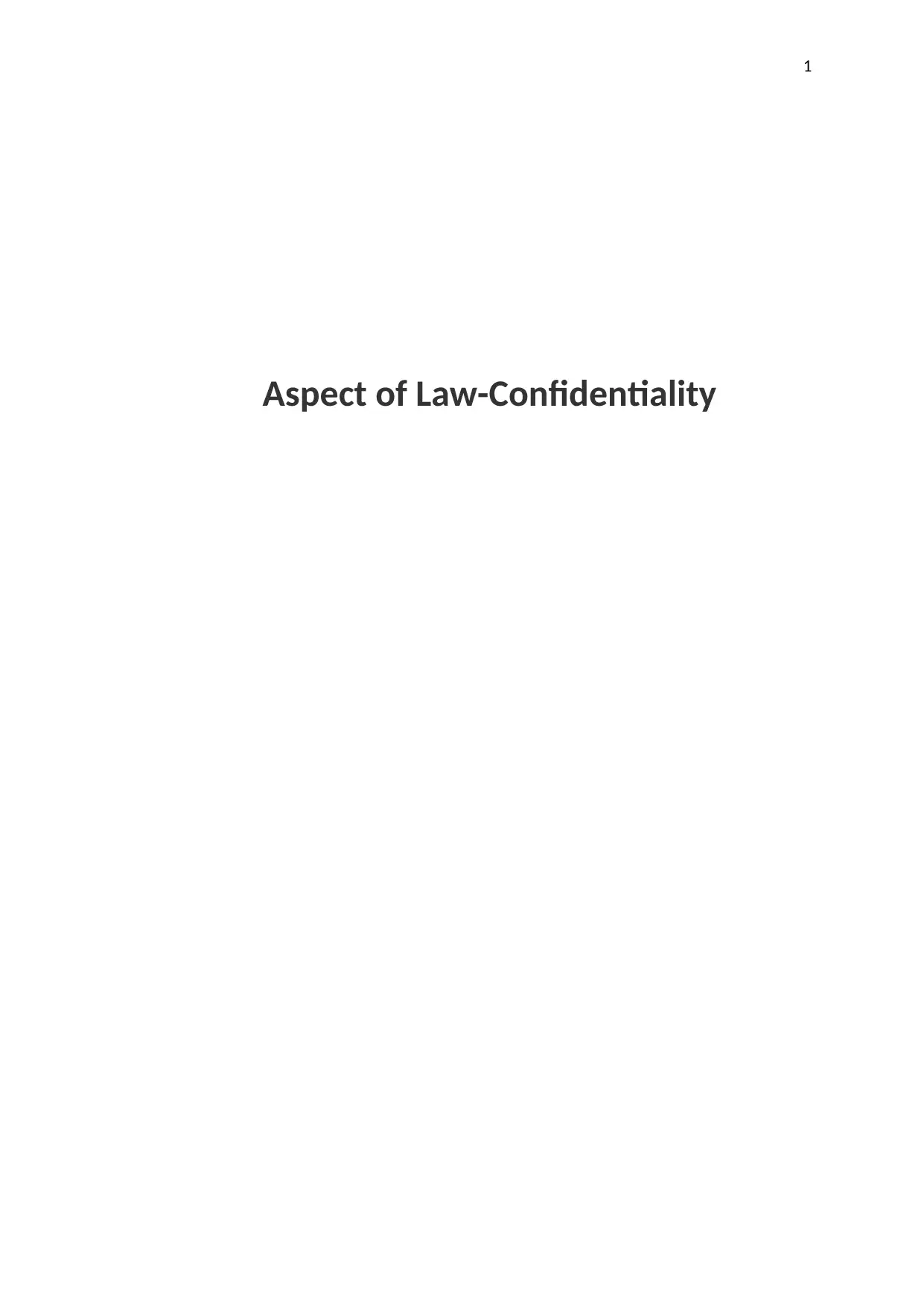
1
Aspect of Law-Confidentiality
Aspect of Law-Confidentiality
Paraphrase This Document
Need a fresh take? Get an instant paraphrase of this document with our AI Paraphraser
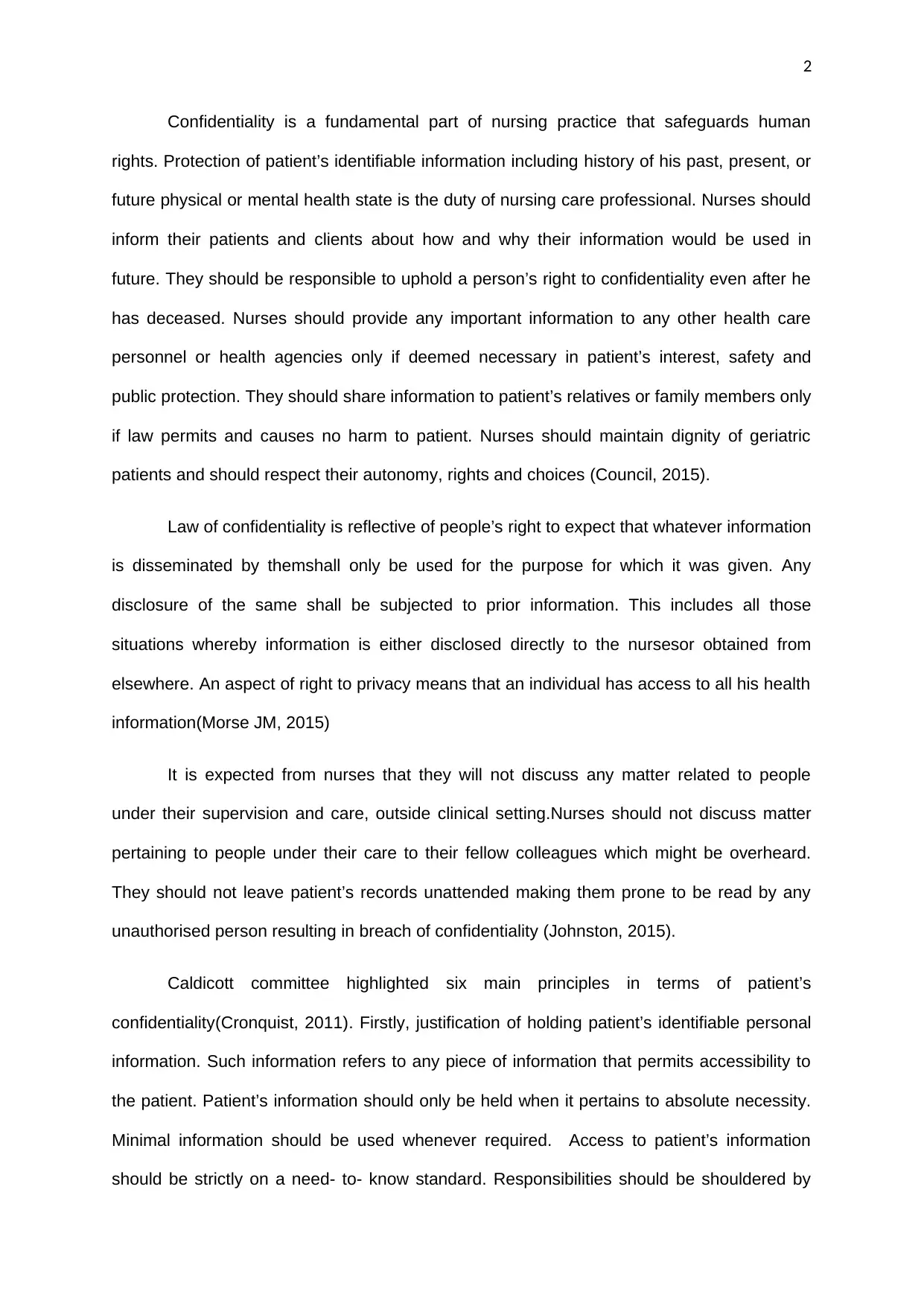
2
Confidentiality is a fundamental part of nursing practice that safeguards human
rights. Protection of patient’s identifiable information including history of his past, present, or
future physical or mental health state is the duty of nursing care professional. Nurses should
inform their patients and clients about how and why their information would be used in
future. They should be responsible to uphold a person’s right to confidentiality even after he
has deceased. Nurses should provide any important information to any other health care
personnel or health agencies only if deemed necessary in patient’s interest, safety and
public protection. They should share information to patient’s relatives or family members only
if law permits and causes no harm to patient. Nurses should maintain dignity of geriatric
patients and should respect their autonomy, rights and choices (Council, 2015).
Law of confidentiality is reflective of people’s right to expect that whatever information
is disseminated by themshall only be used for the purpose for which it was given. Any
disclosure of the same shall be subjected to prior information. This includes all those
situations whereby information is either disclosed directly to the nursesor obtained from
elsewhere. An aspect of right to privacy means that an individual has access to all his health
information(Morse JM, 2015)
It is expected from nurses that they will not discuss any matter related to people
under their supervision and care, outside clinical setting.Nurses should not discuss matter
pertaining to people under their care to their fellow colleagues which might be overheard.
They should not leave patient’s records unattended making them prone to be read by any
unauthorised person resulting in breach of confidentiality (Johnston, 2015).
Caldicott committee highlighted six main principles in terms of patient’s
confidentiality(Cronquist, 2011). Firstly, justification of holding patient’s identifiable personal
information. Such information refers to any piece of information that permits accessibility to
the patient. Patient’s information should only be held when it pertains to absolute necessity.
Minimal information should be used whenever required. Access to patient’s information
should be strictly on a need- to- know standard. Responsibilities should be shouldered by
Confidentiality is a fundamental part of nursing practice that safeguards human
rights. Protection of patient’s identifiable information including history of his past, present, or
future physical or mental health state is the duty of nursing care professional. Nurses should
inform their patients and clients about how and why their information would be used in
future. They should be responsible to uphold a person’s right to confidentiality even after he
has deceased. Nurses should provide any important information to any other health care
personnel or health agencies only if deemed necessary in patient’s interest, safety and
public protection. They should share information to patient’s relatives or family members only
if law permits and causes no harm to patient. Nurses should maintain dignity of geriatric
patients and should respect their autonomy, rights and choices (Council, 2015).
Law of confidentiality is reflective of people’s right to expect that whatever information
is disseminated by themshall only be used for the purpose for which it was given. Any
disclosure of the same shall be subjected to prior information. This includes all those
situations whereby information is either disclosed directly to the nursesor obtained from
elsewhere. An aspect of right to privacy means that an individual has access to all his health
information(Morse JM, 2015)
It is expected from nurses that they will not discuss any matter related to people
under their supervision and care, outside clinical setting.Nurses should not discuss matter
pertaining to people under their care to their fellow colleagues which might be overheard.
They should not leave patient’s records unattended making them prone to be read by any
unauthorised person resulting in breach of confidentiality (Johnston, 2015).
Caldicott committee highlighted six main principles in terms of patient’s
confidentiality(Cronquist, 2011). Firstly, justification of holding patient’s identifiable personal
information. Such information refers to any piece of information that permits accessibility to
the patient. Patient’s information should only be held when it pertains to absolute necessity.
Minimal information should be used whenever required. Access to patient’s information
should be strictly on a need- to- know standard. Responsibilities should be shouldered by
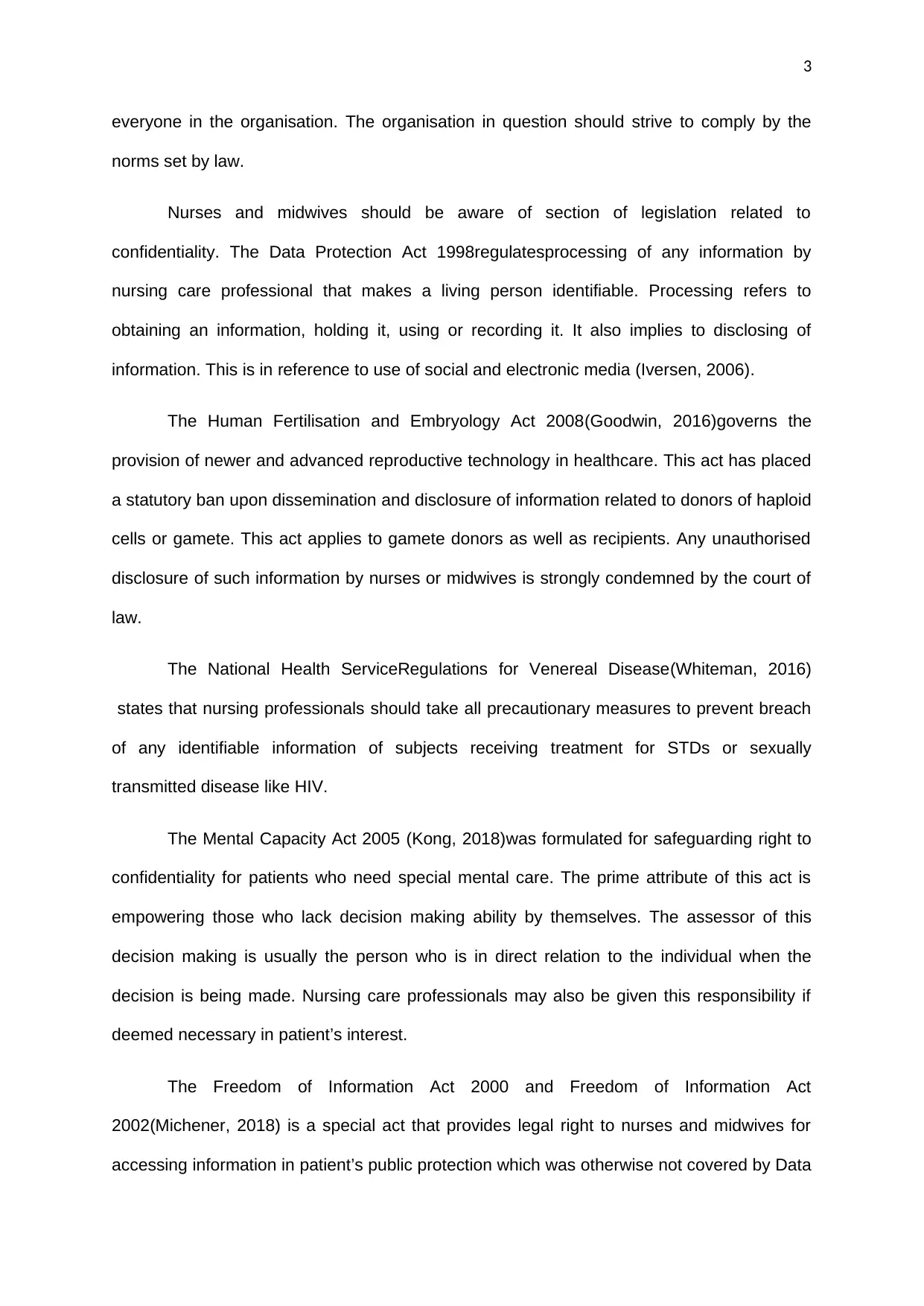
3
everyone in the organisation. The organisation in question should strive to comply by the
norms set by law.
Nurses and midwives should be aware of section of legislation related to
confidentiality. The Data Protection Act 1998regulatesprocessing of any information by
nursing care professional that makes a living person identifiable. Processing refers to
obtaining an information, holding it, using or recording it. It also implies to disclosing of
information. This is in reference to use of social and electronic media (Iversen, 2006).
The Human Fertilisation and Embryology Act 2008(Goodwin, 2016)governs the
provision of newer and advanced reproductive technology in healthcare. This act has placed
a statutory ban upon dissemination and disclosure of information related to donors of haploid
cells or gamete. This act applies to gamete donors as well as recipients. Any unauthorised
disclosure of such information by nurses or midwives is strongly condemned by the court of
law.
The National Health ServiceRegulations for Venereal Disease(Whiteman, 2016)
states that nursing professionals should take all precautionary measures to prevent breach
of any identifiable information of subjects receiving treatment for STDs or sexually
transmitted disease like HIV.
The Mental Capacity Act 2005 (Kong, 2018)was formulated for safeguarding right to
confidentiality for patients who need special mental care. The prime attribute of this act is
empowering those who lack decision making ability by themselves. The assessor of this
decision making is usually the person who is in direct relation to the individual when the
decision is being made. Nursing care professionals may also be given this responsibility if
deemed necessary in patient’s interest.
The Freedom of Information Act 2000 and Freedom of Information Act
2002(Michener, 2018) is a special act that provides legal right to nurses and midwives for
accessing information in patient’s public protection which was otherwise not covered by Data
everyone in the organisation. The organisation in question should strive to comply by the
norms set by law.
Nurses and midwives should be aware of section of legislation related to
confidentiality. The Data Protection Act 1998regulatesprocessing of any information by
nursing care professional that makes a living person identifiable. Processing refers to
obtaining an information, holding it, using or recording it. It also implies to disclosing of
information. This is in reference to use of social and electronic media (Iversen, 2006).
The Human Fertilisation and Embryology Act 2008(Goodwin, 2016)governs the
provision of newer and advanced reproductive technology in healthcare. This act has placed
a statutory ban upon dissemination and disclosure of information related to donors of haploid
cells or gamete. This act applies to gamete donors as well as recipients. Any unauthorised
disclosure of such information by nurses or midwives is strongly condemned by the court of
law.
The National Health ServiceRegulations for Venereal Disease(Whiteman, 2016)
states that nursing professionals should take all precautionary measures to prevent breach
of any identifiable information of subjects receiving treatment for STDs or sexually
transmitted disease like HIV.
The Mental Capacity Act 2005 (Kong, 2018)was formulated for safeguarding right to
confidentiality for patients who need special mental care. The prime attribute of this act is
empowering those who lack decision making ability by themselves. The assessor of this
decision making is usually the person who is in direct relation to the individual when the
decision is being made. Nursing care professionals may also be given this responsibility if
deemed necessary in patient’s interest.
The Freedom of Information Act 2000 and Freedom of Information Act
2002(Michener, 2018) is a special act that provides legal right to nurses and midwives for
accessing information in patient’s public protection which was otherwise not covered by Data
⊘ This is a preview!⊘
Do you want full access?
Subscribe today to unlock all pages.

Trusted by 1+ million students worldwide
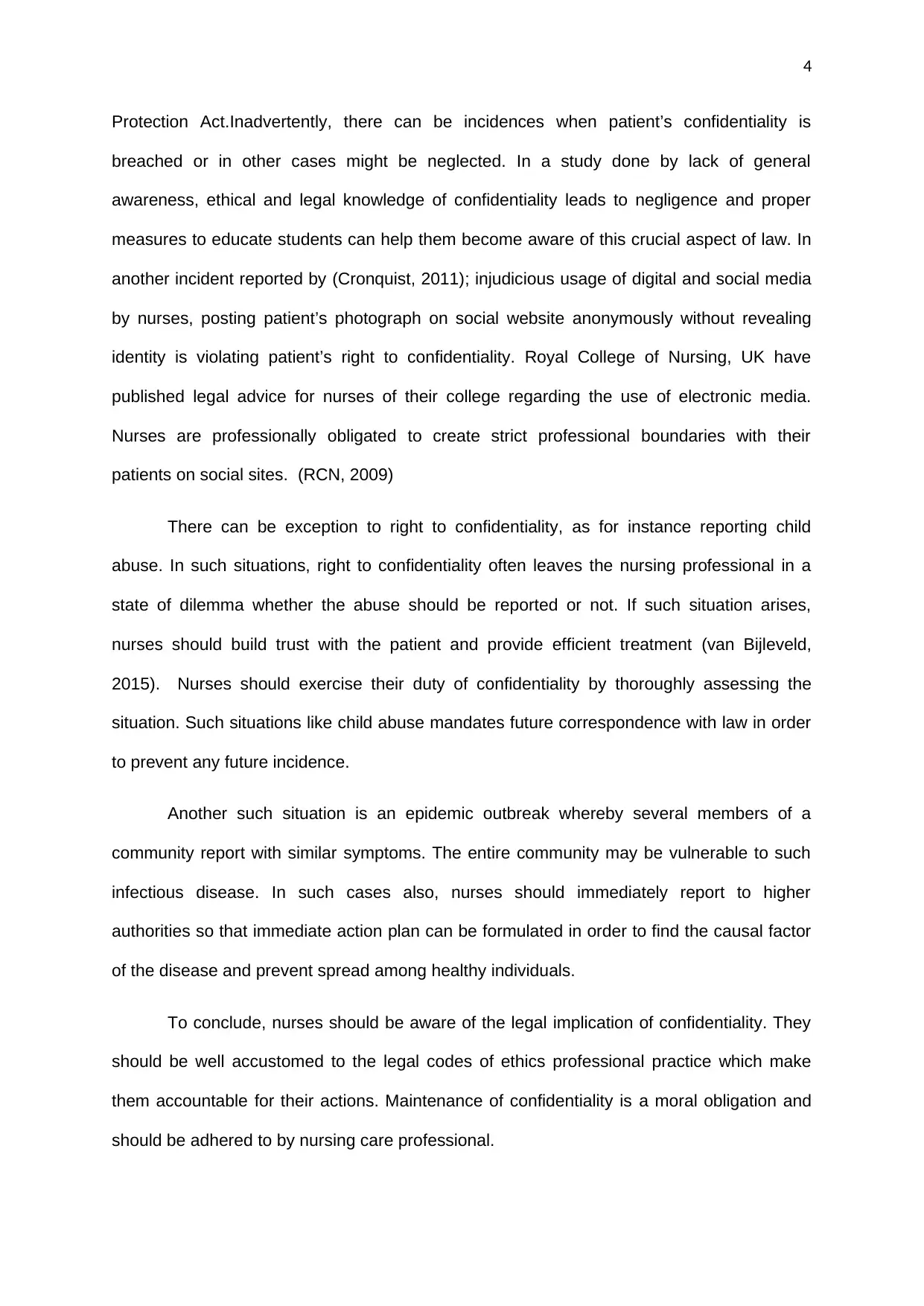
4
Protection Act.Inadvertently, there can be incidences when patient’s confidentiality is
breached or in other cases might be neglected. In a study done by lack of general
awareness, ethical and legal knowledge of confidentiality leads to negligence and proper
measures to educate students can help them become aware of this crucial aspect of law. In
another incident reported by (Cronquist, 2011); injudicious usage of digital and social media
by nurses, posting patient’s photograph on social website anonymously without revealing
identity is violating patient’s right to confidentiality. Royal College of Nursing, UK have
published legal advice for nurses of their college regarding the use of electronic media.
Nurses are professionally obligated to create strict professional boundaries with their
patients on social sites. (RCN, 2009)
There can be exception to right to confidentiality, as for instance reporting child
abuse. In such situations, right to confidentiality often leaves the nursing professional in a
state of dilemma whether the abuse should be reported or not. If such situation arises,
nurses should build trust with the patient and provide efficient treatment (van Bijleveld,
2015). Nurses should exercise their duty of confidentiality by thoroughly assessing the
situation. Such situations like child abuse mandates future correspondence with law in order
to prevent any future incidence.
Another such situation is an epidemic outbreak whereby several members of a
community report with similar symptoms. The entire community may be vulnerable to such
infectious disease. In such cases also, nurses should immediately report to higher
authorities so that immediate action plan can be formulated in order to find the causal factor
of the disease and prevent spread among healthy individuals.
To conclude, nurses should be aware of the legal implication of confidentiality. They
should be well accustomed to the legal codes of ethics professional practice which make
them accountable for their actions. Maintenance of confidentiality is a moral obligation and
should be adhered to by nursing care professional.
Protection Act.Inadvertently, there can be incidences when patient’s confidentiality is
breached or in other cases might be neglected. In a study done by lack of general
awareness, ethical and legal knowledge of confidentiality leads to negligence and proper
measures to educate students can help them become aware of this crucial aspect of law. In
another incident reported by (Cronquist, 2011); injudicious usage of digital and social media
by nurses, posting patient’s photograph on social website anonymously without revealing
identity is violating patient’s right to confidentiality. Royal College of Nursing, UK have
published legal advice for nurses of their college regarding the use of electronic media.
Nurses are professionally obligated to create strict professional boundaries with their
patients on social sites. (RCN, 2009)
There can be exception to right to confidentiality, as for instance reporting child
abuse. In such situations, right to confidentiality often leaves the nursing professional in a
state of dilemma whether the abuse should be reported or not. If such situation arises,
nurses should build trust with the patient and provide efficient treatment (van Bijleveld,
2015). Nurses should exercise their duty of confidentiality by thoroughly assessing the
situation. Such situations like child abuse mandates future correspondence with law in order
to prevent any future incidence.
Another such situation is an epidemic outbreak whereby several members of a
community report with similar symptoms. The entire community may be vulnerable to such
infectious disease. In such cases also, nurses should immediately report to higher
authorities so that immediate action plan can be formulated in order to find the causal factor
of the disease and prevent spread among healthy individuals.
To conclude, nurses should be aware of the legal implication of confidentiality. They
should be well accustomed to the legal codes of ethics professional practice which make
them accountable for their actions. Maintenance of confidentiality is a moral obligation and
should be adhered to by nursing care professional.
Paraphrase This Document
Need a fresh take? Get an instant paraphrase of this document with our AI Paraphraser
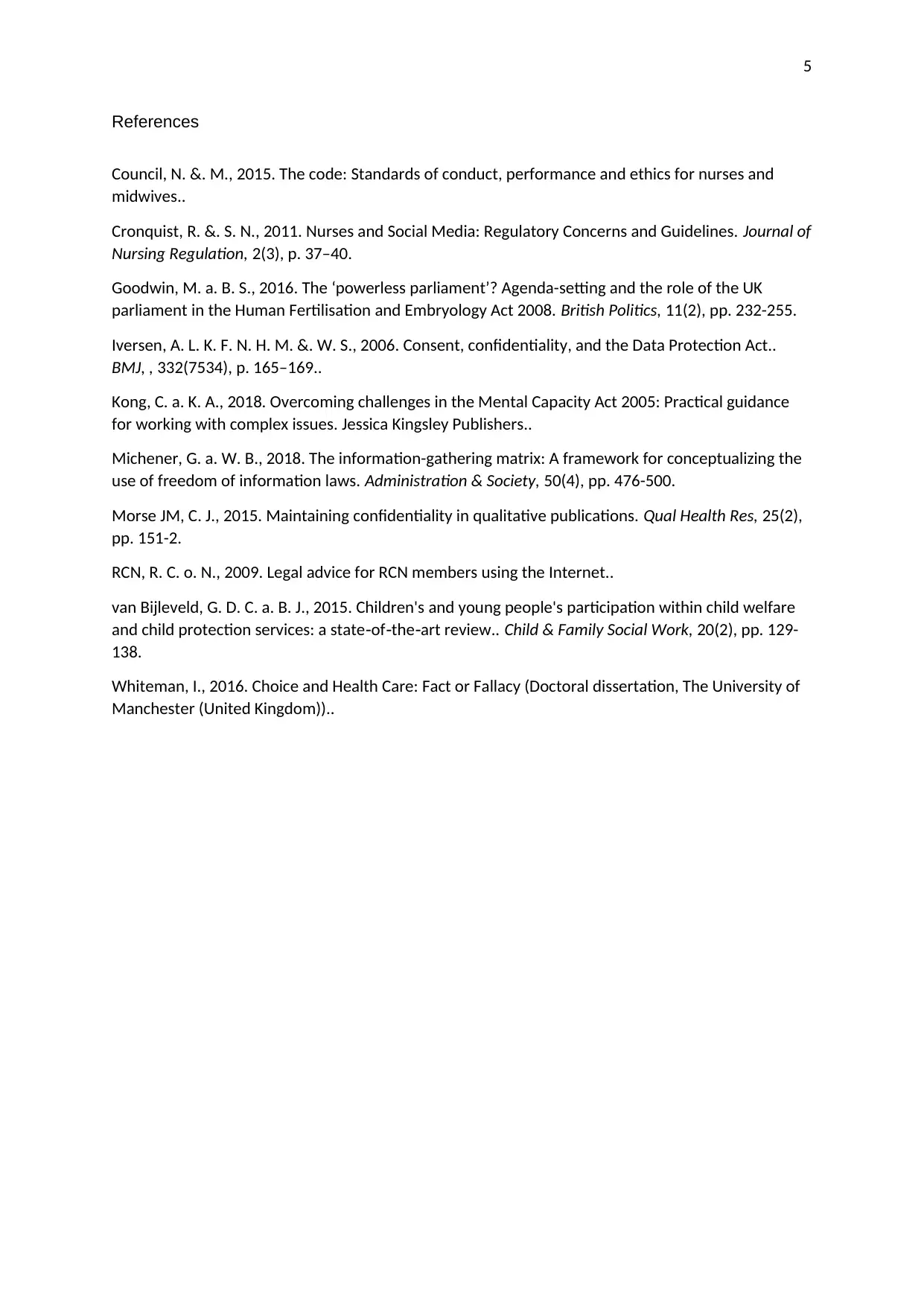
5
References
Council, N. &. M., 2015. The code: Standards of conduct, performance and ethics for nurses and
midwives..
Cronquist, R. &. S. N., 2011. Nurses and Social Media: Regulatory Concerns and Guidelines. Journal of
Nursing Regulation, 2(3), p. 37–40.
Goodwin, M. a. B. S., 2016. The ‘powerless parliament’? Agenda-setting and the role of the UK
parliament in the Human Fertilisation and Embryology Act 2008. British Politics, 11(2), pp. 232-255.
Iversen, A. L. K. F. N. H. M. &. W. S., 2006. Consent, confidentiality, and the Data Protection Act..
BMJ, , 332(7534), p. 165–169..
Kong, C. a. K. A., 2018. Overcoming challenges in the Mental Capacity Act 2005: Practical guidance
for working with complex issues. Jessica Kingsley Publishers..
Michener, G. a. W. B., 2018. The information-gathering matrix: A framework for conceptualizing the
use of freedom of information laws. Administration & Society, 50(4), pp. 476-500.
Morse JM, C. J., 2015. Maintaining confidentiality in qualitative publications. Qual Health Res, 25(2),
pp. 151-2.
RCN, R. C. o. N., 2009. Legal advice for RCN members using the Internet..
van Bijleveld, G. D. C. a. B. J., 2015. Children's and young people's participation within child welfare
and child protection services: a state of the art review..‐ ‐ ‐ Child & Family Social Work, 20(2), pp. 129-
138.
Whiteman, I., 2016. Choice and Health Care: Fact or Fallacy (Doctoral dissertation, The University of
Manchester (United Kingdom))..
References
Council, N. &. M., 2015. The code: Standards of conduct, performance and ethics for nurses and
midwives..
Cronquist, R. &. S. N., 2011. Nurses and Social Media: Regulatory Concerns and Guidelines. Journal of
Nursing Regulation, 2(3), p. 37–40.
Goodwin, M. a. B. S., 2016. The ‘powerless parliament’? Agenda-setting and the role of the UK
parliament in the Human Fertilisation and Embryology Act 2008. British Politics, 11(2), pp. 232-255.
Iversen, A. L. K. F. N. H. M. &. W. S., 2006. Consent, confidentiality, and the Data Protection Act..
BMJ, , 332(7534), p. 165–169..
Kong, C. a. K. A., 2018. Overcoming challenges in the Mental Capacity Act 2005: Practical guidance
for working with complex issues. Jessica Kingsley Publishers..
Michener, G. a. W. B., 2018. The information-gathering matrix: A framework for conceptualizing the
use of freedom of information laws. Administration & Society, 50(4), pp. 476-500.
Morse JM, C. J., 2015. Maintaining confidentiality in qualitative publications. Qual Health Res, 25(2),
pp. 151-2.
RCN, R. C. o. N., 2009. Legal advice for RCN members using the Internet..
van Bijleveld, G. D. C. a. B. J., 2015. Children's and young people's participation within child welfare
and child protection services: a state of the art review..‐ ‐ ‐ Child & Family Social Work, 20(2), pp. 129-
138.
Whiteman, I., 2016. Choice and Health Care: Fact or Fallacy (Doctoral dissertation, The University of
Manchester (United Kingdom))..
1 out of 5
Related Documents
Your All-in-One AI-Powered Toolkit for Academic Success.
+13062052269
info@desklib.com
Available 24*7 on WhatsApp / Email
![[object Object]](/_next/static/media/star-bottom.7253800d.svg)
Unlock your academic potential
Copyright © 2020–2026 A2Z Services. All Rights Reserved. Developed and managed by ZUCOL.





